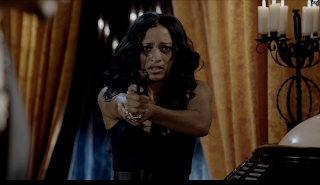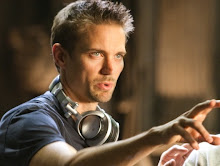Bannen's done. I'm taking meetings now. And I'm currently preparing to pitch ideas. When I think about what the hell I'm going to say in a pitch meeting my mind wanders to the concept of "pitching" itself.
First off, I hate baseball. It hurts my soul that I have to use this analogy. Regardless, I swallow my pride and recognize the three important proponents to pitching.
a) There’s the pitcher- or the writer/director who’s doing the pitching, ie, me, in this case.
b) There’s the ball, which represents the idea.
c) And then there’s the… hitter in this All-American comparison who symbolizes the producer who’s hopefully gonna knock your idea out of the park.
That’s if you’re a great a pitcher, he’s a great hitter and you throw the ball right down the middle of the plate. To hit a home run, you really gotta have your pitch down, it has to be a great idea, and the producer has to be receptive to your idea and be able to do something with it…
But do you need all three to be able to get a film made? As evidenced by all the shit that’s out there these days, I’m guessing that Hollywood is fine with 2 out of the 3, resulting in a lot of base hits.
My job as the writer/director/pitcher is to be a salesman. I need to talk about my idea- no matter what it is- and nod emphatically as I go, convincing him that my speaking about my brainchild makes me giddy because its just that genius!
But lets say I suck at this…
Lets say I stumble over my logline, I ruin the catch-phrases, and I nervously repeat unimportant details for clarity’s sake. How would I possibly get a film made?
Well, it better be a great-fucking-idea, I’ll tell you that much. It better be able to pitch itself. And if its Spielberg, maybe he’ll know what to do with it.
In our baseball analogy, it’d be the equivalent of having Babe Ruth batting off a T-ball stand. He’s not going to hit it out of the park- especially if I can’t get behind the pitch and execute it to its fullest. But maybe we’ll get a double or triple out of it.
Well, lets say I’m a motherfucker and I got my pitch down pat. I’ve been practicing and I know which parts to emphasize and, based on reactions, I can judge when to skip those unimportant details. I can say it forwards and backwards (however unnecessary it is to say it backwards- but I do it only when requested just to show off how well I got it down). And again, lets assume I’m talking to Spielberg, god willing. I’ve been granted an audience of the highest sort and he’s crouched over the plate, and he aims dramaticaly for the back bleachers…
But lets say, instead of throwing a baseball, I wind up and pitch, say… a piece of shit?
What if my idea sucks? I mean, c’mon, we got Spielberg behind the plate and I managed to wad up that piece of shit into a semi-solid shape and send it right down the middle. Well, he can connect as much as he wants but the shit’s just gonna splatter all over anyone within earshot.
Lets be honest, we’ve all seen big guns executing bad ideas and all that happened was a bunch of shit splattered all over the screen.
But what if the idea is not a piece of shit? No, this is not only a top-of-the-line Rawlings (or whatever brand makes baseballs), but this rubber cement/wool (whatever a baseball is made out of) comes with its own set of wing-gliders that pop out of the sides once its in the air, to ensure that it sails…
lets just say the idea is good…
And lets say I’ve got my pitch down as stated above. I wind up, and wink because I know how good this is going to be; what with the gliders and all, it can practically pitch itself! But in this glorious vision I also send that fucker right down the middle of the plate…
And then lets say the hitter… I dunno… would rather be getting a massage. He’s loosely gripping the bat with one hand, a latte in the other; and he half-heartedly yanks his arm in my general direction, to give the impression he gives a fuck.
In this imaginary scenario this guy is fully capable of hitting it out of the park- he just doesn’t feel like it. There are plenty of producers out there who have the resources but can’t spot a good idea to save their life…
The other possibility is it’s a kid who’s grown up watching baseball, he’s studied everything about the physics of hitting… but he just can’t do it himself…
In both of these cases, maybe you’ll get a bunt- or a foul ball at most, but you won’t be stealing home in this scenario, that’s for sure.
Then there are those rare cases when only one of the three elements is in place. Unfortunately, miraculously, movies get made like this. I’m seeing images of a lone batter lofting a piece of shit in the air, swinging valiantly, and sending spotty brown chunks all over himself; Or the pitcher saying “fuck this non-existent batter, I’m gonna try and toss this piece of shit over the back wall myself.”
Okay, its my analogy that’s gone to shit really.
The point is I know at this stage that my job is to craft and/or acquire the best ideas possible, and then get it down so I can talk about it like its part of my childhood lore, and then make sure I find the right person who can do something with it.
It’s a tough business and there’s a lot of people out there who are stepping up to the plate… or the pitcher’s mound… or whatever…
I don't mind pitching, as long as I don't have to be anywhere near an actual baseball stadium.
~ JW


